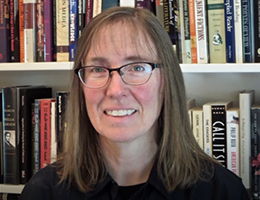Alexandra Bradner
 Why did you choose Northwestern?
Why did you choose Northwestern?
I was interested in the philosophy of science, and Northwestern's philosophy department could cover the philosophy of physics and biology, with Arthur Fine, David Hull, and Thomas Ryckman, and history of science with Ken Alder. Beyond that special focus, the department was known for working across the analytic-continental divide, as everyone seemed to share a pragmatic conception of truth.
How would you describe your research and/or work to a non-academic audience? What was it then and/or what it is now?
From 1995–2005, I worked on a Pyrrhonian dissertation arguing that pragmatists about scientific explanation cannot establish universal grounds for the rejection of explanation requests, which leaves their theories unconstrained. Since then, I have moved on to think about the cognitive science of interpersonal explanation and understanding, in a pragmatic vein. I work with a cognitive scientist to think about how background contexts might operate to constrain contrast classes (non-actual, alternative possibilities) and relevance relations in explanation.
Tell us who or what inspired your research and/or work.
Meredith Williams's seminar on the later Wittgenstein, Michael Williams's seminar on Pyrrhonian skepticism, Tom McCarthy's seminars on Kant's regulative ideals in the first Critique and Kant's Metaphysics of Morals, Arthur Fine's NOA and his many courses on social constructionism in philosophy of science, David Hull's social epistemology, and Bas Van Fraassen's constructive empiricism. The graduate teaching at Northwestern was truly excellent. We had amazing courses, many with returning semester-long visitors like Jurgen Habermas, Robert Brandom, Charles Taylor, etc. I think the department's strong emphasis on responsible teaching is one of its legacies, as many of the best teachers of philosophy I know earned their degrees from Northwestern. Ken Bain was directing the Searle Center during that period, which likely had an impact as well.
What are you most proud of in your career to date?
I have worked very hard, at the highest governance levels of my discipline, to remind philosophers that teaching is the most valuable and impactful thing that they do; it's where our primary focus should be. This might not be the case for every discipline. But, I would argue, philosophy is centrally about the nurturing of a particular collection of teaching and learning virtues. Under my chairship, the APA teaching committee created The Teaching Hub, a two-day faculty development event now held at all three of our annual divisional meetings. I am also the executive director of the American Association of Philosophy Teachers. I've written a few scholarly papers and hope to write many more, now that my caregiving responsibilities are coming to an end. But I am most proud of the work I have done on the pedagogical side of my discipline.
Tell us about a current achievement or something you're working on that excites you.
Twenty years after Arthur Fine, David Hull, Philip Kitcher, and Bas Van Fraassen were talking about values in science, the contextual aspects of explanation, and the distinctions (and lack thereof) between the context of discovery and justification, it finally has become fashionable for philosophers of science and social epistemologists to write about "pursuit-worthiness," relevance, and the ways in which models capture modality. These were interests of mine in the 1990s, so I'm looking forward to catching up and thinking about whether my thesis work might add anything to the current discussions. My scholarship took a leap during the pandemic because I was able to attend so many conferences and workshops via Zoom. I'm also looking forward to a paper on textbook science that I'm writing for a Cambridge University Press anniversary volume on Kuhn's Structure.
What advice would you give your younger self or someone considering a similar path?
Despite what you might wish to be the case, what everyone says is true: No one really cares about your teaching or your contributions to the fulfillment of either society's or individuals' needs. The only thing that matters is how many publication lines you can add to your CV.